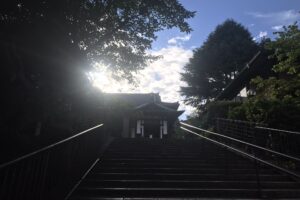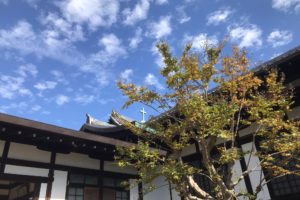4th Sunday after Pentecost (Proper 9 ), July 3, 2022
Luke 10:1-11, 16-20
Rev. Misa Furumoto
Summer time in Japan has been the special time to think about peace. We just had Okinawa Memorial Day on June 23rd; it is the day to remember the lives lost during the battle of Okinawa in the second world war. This year is also the 50th anniversary of Okinawa reversion to Japan from US rule. During the battle of Okinawa, it is said that over 240,000 lives were killed including nearly 100,000 civilians. Ordinary people’s daily lives, daily happiness and joy, their loving families, friends, and lovers were all taken away at once. This is the war, and it happened 77 years ago. It is a history. But is it really? No. The same thing is repeating in Ukraine, and it’s been over four months since the Russian aggression began in February. Why, haven’t we learned a thing from our history? How stupid we humans are! Can’t help thinking like that. Why can’t we stop it? Precious lives created by God are being lost at this very moment. Recently, the phrase given by John Lennon and Yoko Ono keeps coming back to me. “War is over if you want it.” Yes, we can make it over if we want it, I believe. Let us keep praying God so that we are given courage, wisdom, and strength to stop war and not to start another one.
The reason why I spoke of war and peace this morning is that I thought God was giving us an important message through today’s Gospel about how to make peace on earth. Today’s Gospel is about Jesus sending out 70 some of his followers for missionary work. Jesus decided to send them in pairs to every town and place where he himself intended to go. The mission was to visit people’s houses one by one and proclaim the kingdom of God and teachings taught by Jesus. This trip was going to be tough; Jesus knew it. Think about it. If the visitor were Jesus himself the superstar, the person of the house may welcome him in and try to listen to him. But that wasn’t the case. The visitors were unknown followers of Jesus looking just like beggars carrying no purse, no bag, no sandals. No sandals! They were barefooted. So why did they come? To tell you about God. Why God?
Luke who wrote this Gospel doesn’t tell us the names of the places they were to visit. Some may well have been foreign villages where gentiles lived. At that time, gentiles were recognized as sinners and enemies by Jews as they were worshiping pagan gods. The Bible is written only from the viewpoint of Jews, but I’m sure people called gentiles hated the Jews as much. They wouldn’t want to talk with Jews. Why would they welcome Jesus’ followers in their houses?
A half or more of the houses the 70 followers were to visit may have been those of Jews’. The Jews then knew about God very well. They were all to memorize the important laws of Moses, and knowing those laws meant knowing God. People wouldn’t need new teachings. Any kind of new teachings added to the Moses’ law were recognized as wrong and pagan. So, once the followers of Jesus come to your house and try to give you new teachings about God, it was very natural for you to refuse them, saying “No, thank you. Go away” or some could even throw stones at them.
So, Jesus tells the followers: “See, I am sending you out like lambs into the midst of wolves.” What a threat! But Jesus just wanted them to be prepared.
Then he says an odd thing, “Whatever house you enter, first say, ‘Peace to this house!’” Isn’t this strange? When you visit someone for the first time, you would usually introduce yourself and try to show that you are not anyone suspicious. But Jesus instructs us to say before anything else “Peace to this house!” Come to think of it, it may be a good idea. When we try to speak to someone, we tend to be so selfish and egoistic. “Listen, I do this, I did that, I wish, I want…” , always “me, me, me!” first. But not like that, Jesus says. Pull all those “me, me, me” back once and wish the person you are facing a peace. Moreover, Jesus says, “if anyone is there who shares in peace, your peace will rest on that person; but if not, it will return to you.” It will return to you! Isn’t that nice? Even if the person to whom you wish a peace says “no thank you” or hates you or throw a piece of stone at you, don’t worry about it. The peace will return to you.
This reminds me of a story told by late Sister Kazuko Watanabe. She was a Catholic sister and wrote many books. One of her very famous books of essays which has become a best seller is titled “置かれた場所で咲きなさい” meaning “Bloom where you’re planted.” In this book, she tells us like this. “Always remember to smile. When you meet someone or when you catch someone’s eye, always become the first person to offer a smile. Try to smile specially at those who look angry or tired or have even forgot how to smile. Those people truly need a smile from someone. The person who received your smile may or may not return a smile to you. Even if you don’t get one back, don’t worry. Think this way. The smile you offered but rejected is put in God’s pocket. And God takes your precious smile out of his pocket and give it to someone who needs it at the best time, in the best way.
Everyone on the earth is a child of God. We are all brothers and sisters. Why not we become a person who wishes a peace for someone first and who smiles at someone first. They won’t be wastes. Even if they are not received they will either come back to you or passed on to those who need them by God. Let us remember always God loved us first. Becoming the first person to love is the way to make peace on earth, and above all, the way to proclaim the kingdom of God.
In the name of the Father, of the Son, and of the Holy Spirit, Amen.













